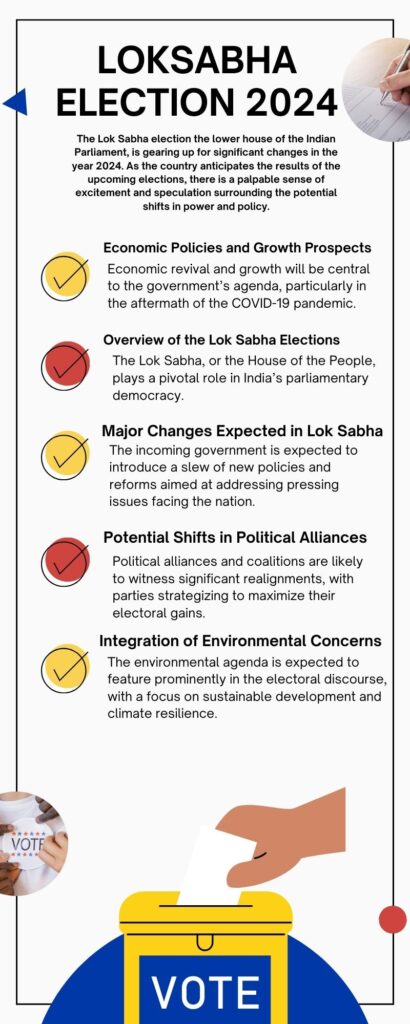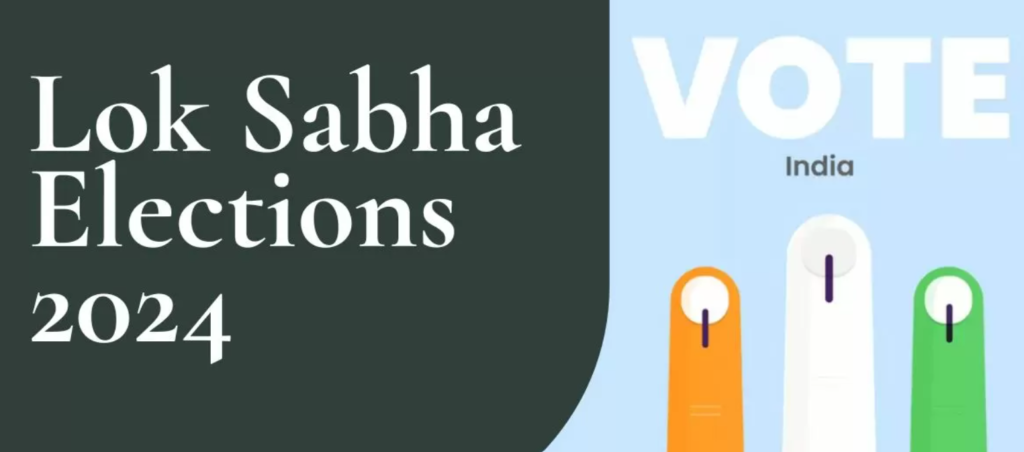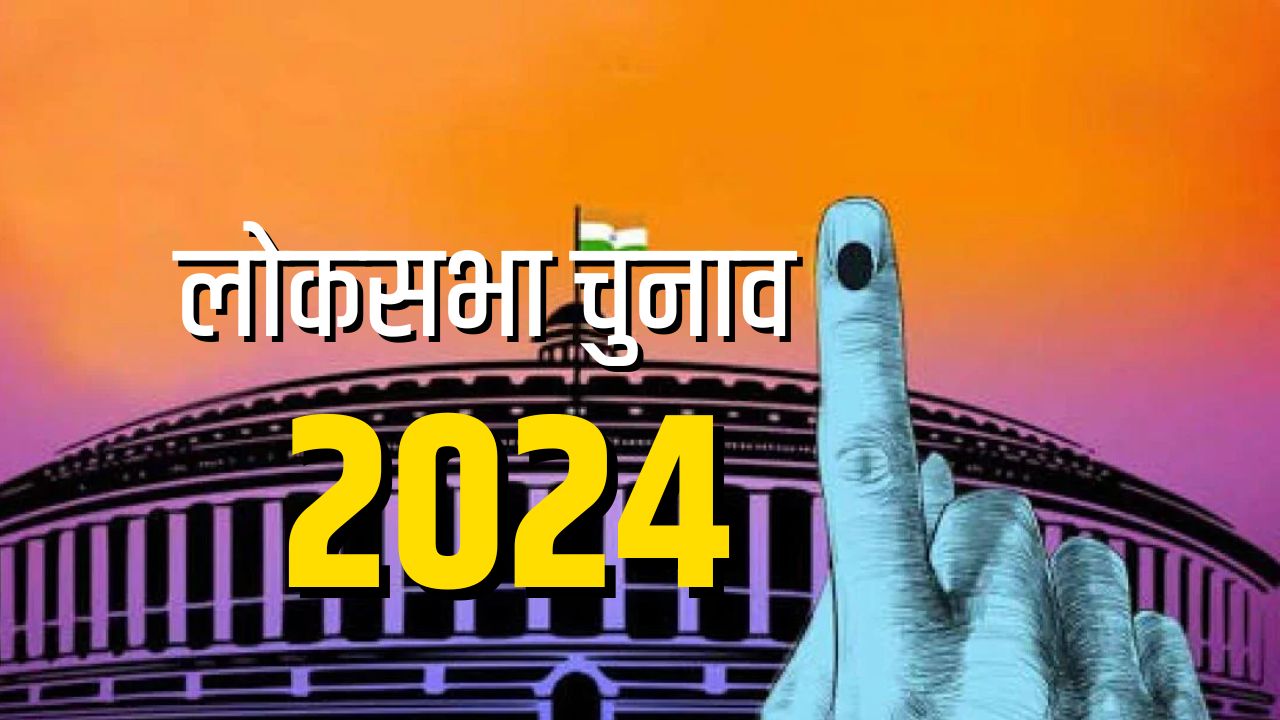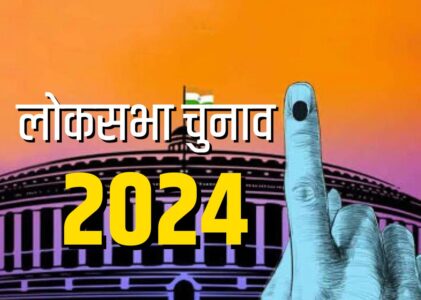LOKSABHA ELECTION 2024 UPCOMING MEJOR CHANGINGS
The Lok Sabha election the lower house of the Indian Parliament, is gearing up for significant changes in the year 2024. As the country anticipates the results of the upcoming elections, there is a palpable sense of excitement and speculation surrounding the potential shifts in power and policy. Let’s delve into the intricacies of what these changes might entail and their implications for India’s political landscape.
1. Overview of the Lok Sabha Elections in 2024
The Lok Sabha, or the House of the People, plays a pivotal role in India’s parliamentary democracy. With 543 seats up for grabs, these elections hold immense significance in determining the country’s leadership and policy direction
2. Major Changes Expected in Lok Sabha 2024
The incoming government is expected to introduce a slew of new policies and reforms aimed at addressing pressing issues facing the nation. From economic revitalization efforts to social welfare schemes, these initiatives will shape the government’s agenda for the next term.

Potential Shifts in Political Alliances
Political alliances and coalitions are likely to witness significant realignments, with parties strategizing to maximize their electoral gains. Key players may form new alliances or forge unexpected partnerships to strengthen their electoral prospects.
Impact of Technological Advancements
Advancements in technology are poised to revolutionize the electoral process, with the widespread adoption of digital platforms for campaigning and voter engagement. From online voter registration to virtual rallies, technology will play a pivotal role in shaping electoral outcomes.
3. Changes in Demographics and Representation
Analysis of Demographic Shifts
Demographic changes, including population growth and urbanization, will influence the electoral landscape. Understanding these shifts is crucial for political parties to tailor their campaigns and policies to resonate with diverse voter segments.
Representation of Marginalized Communities
Efforts to enhance the representation of marginalized communities, including women, minorities, and indigenous groups, will be a key focus area. Empowering these segments of society is essential for fostering inclusive governance and equitable development.
4. Role of Social Media and Digital Platforms
Influence of Social Media
Social media platforms will continue to exert a significant influence on election campaigning, serving as a vital tool for political communication and mobilization. Parties will leverage social media to disseminate their messages and engage with voters on a wide scale.
Regulations and Challenges
However, the growing influence of social media also raises concerns about misinformation, fake news, and online manipulation. Striking a balance between freedom of expression and regulatory oversight will be critical to safeguarding the integrity of the electoral process.
5. Environmental and Climate Change Agenda
Integration of Environmental Concerns
The environmental agenda is expected to feature prominently in the electoral discourse, with a focus on sustainable development and climate resilience. Parties will be compelled to present comprehensive plans to address environmental degradation and mitigate the impacts of climate change.
Policies for Sustainability
From renewable energy initiatives to conservation efforts, there will be a concerted push towards sustainability across various sectors. The next government will face mounting pressure to prioritize environmental conservation and adopt eco-friendly policies.

6. Economic Policies and Growth Prospects
Discussion on Economic Reforms
Economic revival and growth will be central to the government’s agenda, particularly in the aftermath of the COVID-19 pandemic. Measures to stimulate investment, boost manufacturing, and create employment opportunities will be prioritized to reignite economic growth.
Initiatives for Employment
Unemployment remains a pressing challenge, especially among the youth demographic. The government is expected to roll out targeted programs and incentives to promote entrepreneurship and skill development, thereby generating job opportunities and fostering economic empowerment.
7. International Relations and Diplomatic Priorities
Foreign Policy Shifts
India’s foreign policy priorities are expected to evolve in response to changing geopolitical dynamics and global challenges. The government will seek to strengthen diplomatic ties with key allies while navigating complex regional and international relations.
Global Partnerships
Bilateral and multilateral agreements will play a crucial role in shaping India’s engagement with the international community. Collaborative efforts on issues such as trade, security, and climate change will be instrumental in advancing India’s interests on the global stage.
8. Challenges and Opportunities Ahead
Identifying Key Challenges
The new government will inherit a range of challenges, including economic recovery, social inequality, and geopolitical tensions. Addressing these challenges will require bold leadership, innovative solutions, and sustained public engagement.


